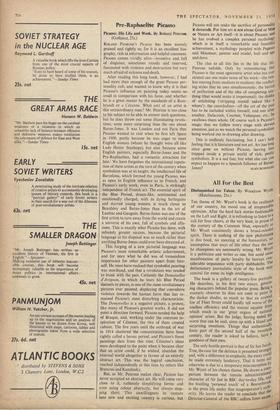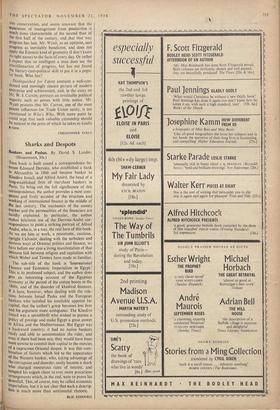All For the Best
Distinguished for Talent. By Woodrow Wyatt. (Hutchinsons, 21s.)
THE theme of Mr. Wyatt's book is the resilience of our country, his mood one of irrepressible optimism. After the hard luck stories fashionable
on the Left and Right, it is refreshing to listen to a call for four cheers, at the very least, in praise of the century of the Common Man, especially as,
Mr. Wyatt consistently shows a broad-minded spirit. There is nothing of the new philistinisin in this book, no sneering at the humanities, no assumption that ways of life other than the one he champions are necessarily wrong. Mr. Wyatt is a politician and writes as one, but amid some manifestation of party loyalty he betrays On' siderable impatience with party shibboleths. The declamatory journalistic style of the book maY conceal for some its high intelligence.
The book is a gallery of twenty-five portraits. He describes, in his first two essays, govern' ing characters behind the popular press. Being a masterly observer he does not omit to paint the darker shades, so much so that an avoweu foe of Fleet Street could hardly tell worse of the soulless efficiency and the mental squalor from which much in our 'great organs of national opinion' arises. But the judge, having noted the worst that can be said, sums up with a bland and surprising sweetness. Things that authentically form part of the second half of the twentieth century, the reader is asked to believe, have a goodness of their,own. The only hostile portrait is that of Sir Ian Jacob' True, the case for the defence is presented strongly and, with a difference in emphasis, the essay conld be made extremely laudatory. That it turns out otherwise is due to a temporary misconception 01 Mr. Wyatt of his chosen theme. He draws a corn: parison between the remote administrational character of Sir Ian in BBC day-to-day life, and the bustling 'personal touch' of a Beaverbrook in the press life under that magnoperator's attql ority. He leaves the reader to conclude that the Director-General of the BBC suffers from exces.
sive conservatism, and seems unaware that the separation of management from production is much more characteristic of the second than of the first half of the century, and that that way progress has lain. Mr. Wyatt, as an optimist, sees progress as inevitably beneficent, and does not aPPly the Einstein kind of geometry (I don't know its right name) to the facts of every day. Or rather I expect that so intelligent a man does see the irrectilinearism of progress, but has not found the literary-cum-political skill to put it in a popu- lar book. Who has?
Distinguished for Talent contains a well-con- densed and movingly sincere picture of modern enterprise and achievement, and, in the essay on Mr. W. J. Carron, portrays an invaluable political sagacity such as passes with little notice. Mr.
Yatt protests that Mr. Carron, one of the most Potent influences for Trade Union sanity, is not mentioned in Who's Who. With more point he could urge that such valuable citizenship should be noticed in the press of which he takes so kindly a view.
CHRISTOPHER SYKES















































































 Previous page
Previous page